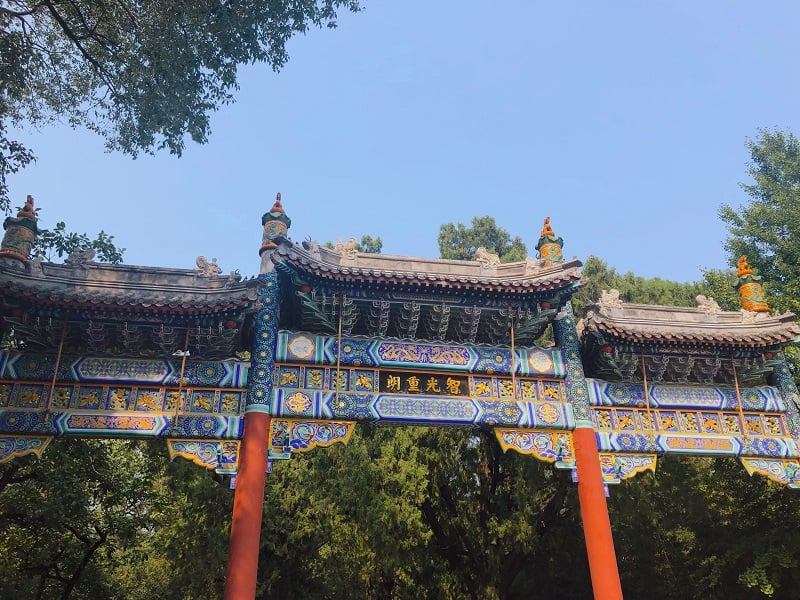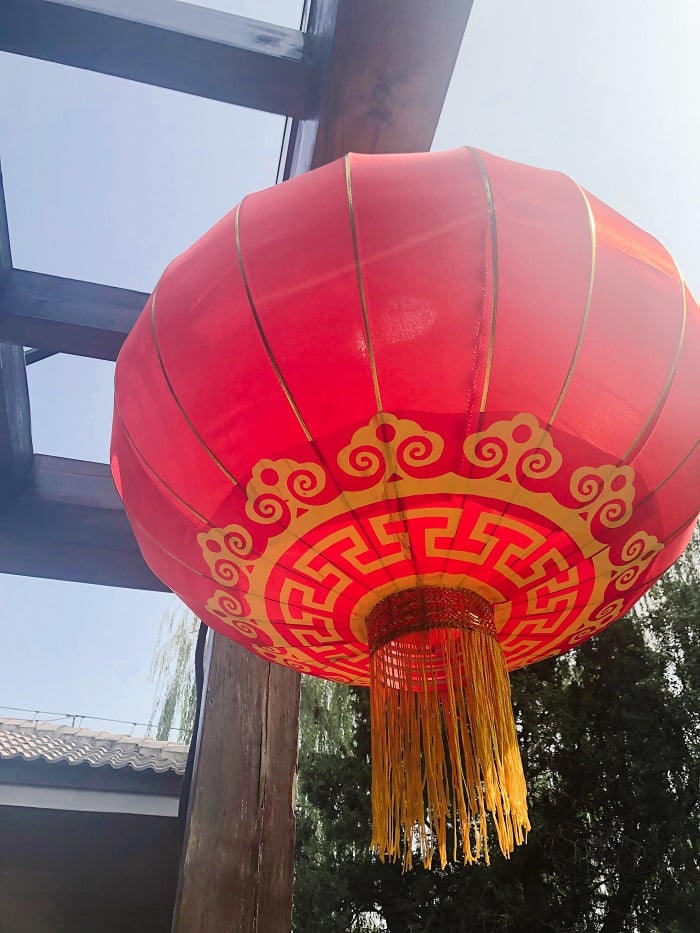Written by Kaylee Henderson (Kalamazoo College), Student Correspondent for CET Beijing, Fall 2019
I’ve had the idea to write this blog for a while—things I wish I had known before I arrived in Beijing. Originally, this blog started as a list compiled over my first few weeks in China. I wanted to have record of these things so that I could come back to my university at home and relay them in hopes of making future study abroad students’ experiences even just a little smoother. Then the idea came to me to make it into a blog post so that it was more accessible. As a Fund for Education Abroad scholar, I blog my experiences weekly on a personal website. However, the only people ever really reading those blogs are family and friends. Then I thought about the potential of posting this blog to CET’s Student Voices blog. I knew that it would reach a wider audience, as well as provide pertinent information to students considering CET China programs.

I would like to clarify that, of course, one cannot go into study abroad believing that they know everything about their host country. Likewise, you truly can’t go into a program having expected every single thing—that’s part of the challenge of study abroad. However, there are certainly things that can aid a student’s preparations for study abroad, whether that be mental preparation or even packing. It can also make students feel more at ease before leaving, as packing up and leaving behind all of your life’s comforts can be, quite frankly, uncomfortable and scary.
That being said, let’s jump in!
1. Don’t have high expectations for Internet.
We all know about the Great Firewall, however, accessibility to Internet in China goes far beyond that. Wi-Fi connection is spotty in many places. Your phone or VPN may be incompatible with the Wi-Fi. But if your phone says you can’t connect to the Wi-Fi, try a couple more times and it might work.
Plan for this as you need: some students’ roommates bought their own routers to use in their room (but even these have connection issues). Many students also use cell phone/laptop hotspots as Wi-Fi alternatives. Spotty Wi-Fi and China’s firewall doesn’t mean you can’t access your favorite apps: Instagram, Twitter, Facebook, etc. Just make sure you have a VPN!
2. Speaking of VPNs, download multiple VPNs before you arrive in China.
Many VPNs will offer you a free trial for a few days before they start charging you for their services, and even then, some offer a X-day money back guarantee. Try to download as many of these in your last days leading up to your departure date. First, many VPNs cannot be downloaded in China. Second, it’s always changing which VPNs servers are blocked or best functioning here, so it’s best to try out a bunch in your first few days here and make your decision based on that. For example, I had Express VPN downloaded before I left for China. Many people recommended this VPN to me, as it was believed to be the best option while in China specifically. It turned out to be incompatible with most Wi-Fi, and now has stopped working altogether. I would also recommend having more than one VPN to switch between, as I’ve heard that sometimes a VPN’s usage can fluctuate. Thus, don’t discount the free VPNs or paid VPNs that can be downloaded in China. I would highly recommend Star VPN ($36 for a year, downloadable in China as of right now) and a free VPN available only on the App Store called “VPN” (the logo is a white key).
3. You should unlock your cell phone before coming to China, otherwise plan on having to buy a Chinese phone.
It is quite necessary to have a Chinese phone number in China—it’s needed to log into some Wi-Fi and open a bank account. Unlocking your phone and putting a Chinese SIM on it is comparably cheaper than buying a Chinese phone, but you can still buy a nice, brand-new phone for ≤$100 USD. I ended up doing this myself, as I couldn’t afford to unlock my American phone. I bought a Huawei phone, which I wouldn’t recommend if you plan to download any non-Chinese apps to your phone (Huawei phones can no longer access the Google Play Store).
4. Despite how convenient using cash may seem, consider opening a Chinese bank account.
One can definitely survive in China using cash, as many places still accept cash (it definitely wouldn’t hurt you to know the phrase “可以用现金吗?” though—can I use cash?). However, it’s a bit inconvenient, both for you and store clerks. It’s not very safe to carry large amounts of cash on your person, and store clerks sometimes don’t have the cash to give you correct change. Using Alipay/WeChat Pay is very convenient and can be used virtually anywhere you go in Beijing. Bank accounts are also useful for topping up the number of cards you’ll accumulate in your time here: your cafeteria card, water/laundry card, and your phone bill. I would recommend going to China Everbright Bank (中国光大银行), as they will often times help you set up Alipay or WeChat Pay.
5. Even the best of us experience 水土不服 shui tu bu fu.
“水土不服” is a Chinese term used to refer to one’s inability to acclimate to a new place’s lifestyle, food, water, air, etc. Upon arriving to China, I couldn’t understand why I couldn’t eat much food or didn’t want to drink a lot of water. Just know that like adapting to a new country’s culture, adapting to a place’s food and drink also takes time.
6. Food in Beijing is very oily, and access to fresh/raw fruit and vegetables is limited.
Sometimes ordering 外卖 waimai (takeout services—like Uber Eats!) pizza feels less oily than the food at the cafeteria and restaurants. The oil can take a toll on your physical and mental wellbeing—it’s hard to adjust to, and when your body isn’t feeling good your psyche doesn’t feel good either. It’s in your best interest to ask locals where the best fruit stores are/which ones have the freshest fruit. As for vegetable stores/markets, I have yet to hear of or find any.


7. Weather in Beijing is extremely dry.
In the month I’ve been in Beijing, it’s only rained twice. This can affect your overall health—drink plenty of water, bring skin and face lotion from the U.S. (most lotions in China has bleaching agents save for baby lotion), having hand lotion is nice, too, but you can find that here.
8. It’s easy to get dehydrated.
Since the tap water isn’t drinkable, you have to rely on filtered or boiled water. If you’re not a fan of warm or hot water, it’s up to you to go buy bottled water regularly. Find your nearest 物美 Wu Mei or other supermarket and buy the giant jugs. They’re super cheap and can last you a while!
9. You can use the water to brush your teeth.
10. Summer/early Autumn in Beijing is hot!
I arrived in Beijing in late August. The average temperature since then has been around 85-90 degrees Fahrenheit every day. The majority of my program is during Autumn/Winter, so I packed for those seasons. Entering the second week of October, we’re finally seeing cooler temperatures!
11. Enjoy the rare days the weather is more comfortable. Make sure to get out and walk or take a trip somewhere with friends.



12. Don’t flush the toilet paper.
13. The squat toilets aren’t as scary as they seem.
With practice, you’ll become a squat toilet pro. (I prefer the squat toilets, actually!)
14. Don’t be afraid to wear a mask.
Some days, it may seem like you’re the only one wearing one—know yourself and know what air quality levels affect you. Don’t risk your health and wellbeing for the sake of fitting in.
15. The water in Beijing is hard.
Bring along some deep conditioner from home to try to offset the damage it will inevitably do to your hair. It can also dry out your skin.
16. Night sweats are a thing.
Honest, no one told me this, so you can imagine my surprise (and discomfort) when I woke up the first night at 3 A.M. having sweat through my pajamas and my sheets (maybe this is part of the whole 水土不服 thing?)
17. Do proper research on what things are easy/difficult to buy in China.
Some things that come to mind that are hard to come across are deodorant, razors, shaving cream, tampons, knives, and dental floss. Also keep in mind that OTC medication cannot be purchased at your local supermarket in the same way it can in the U.S. However, China has some “uniquely China” things that I’ve never seen in the U.S. before. I think things like this make great gifts for folks back home!
18. On the same note, if you use special products, bring a supply large enough to last your entire stay.
For example, I have thick, unruly curly hair that only likes certain products by certain brands with certain ingredients. These products are not readily available in China, as the greater population has no use for them. You may want to consider making even more space in your luggage for extras, just in case. It’s not easy to receive international shipments in China.
19. Don’t be afraid to try new things.
Of course, we all have personal favorites and necessities, but don’t be afraid to take chances on new things. Sometimes it’s the most fun when you can only read a few of the characters and can deduce what it is by pictures. I’ve found some new favorites here by doing that!
20. Broadly speaking, things in China can be very cheap, especially compared to the U.S.
That being said, you should still budget your money in China. Since things are so cheap, it’s easy to take on a big-spender mentality. And beware, imported products from Western brands can run for higher than they would in the U.S.
21. Public transportation in China is extremely efficient. Don’t be afraid of the subway or the bus; take advantage of them!

22. Look both ways before you cross any road.
There are bikers everywhere. While crossing a large intersection, continue to be aware of the cars and bikes around you. Some of them will just go despite you already entering the intersection.
23. The act of gift-giving is valued in Chinese society.
I was surprised by how often my roommate would gift me with snacks, fruit, or little knickknacks from Taobao. It makes you feel really good to receive a gift for no reason—just that they were simply thinking of you. Consider gifting your roommate, Chinese friends, or classmates, whether that be something as simple as some fruit or a meal out at a restaurant.
24. Take so many pictures and remember to get out and have fun!
25. Regularly document your experiences in a way that you enjoy.
It helps to not only reflect on and think critically about your experiences, but also to decompress. Blogging turned out to be a lot more fun than I thought it would be! A blog, journal, or artwork of any sort can also be used to your advantage when talking about study abroad with potential employers. I especially enjoy blogging since I can share them with my friends and family all around the world.
26. Make good use of the CET Alumni Support list!
In all honesty, I did not make use of this list. This is one of my biggest regrets. Had I got in contact with CET China alum, I might have been more aware of some of these things before I came here!
27. The feelings you experience during study abroad can feel isolating. Just know that a lot of other people are feeling the same way. Just talk to each other; be vulnerable.
28. Studying abroad is by no means easy, but you just need to take it all day by day. Rely on family, friends, and classmates to get through it.
Meanwhile, push yourself. Step outside of your comfort zone; try new food, flavors, talk to new people, smile at strangers. Don’t be afraid to feel uncomfortable, and most importantly, don’t be afraid to mess up. Chinese people are very friendly; they are impressed by your Chinese no matter how correct or fluent you sound, and they will often be very patient with you. Use this to your advantage—ask questions, utilize the new grammars you’ve learned in class. At the very least, never forget a smile and a 谢谢.

